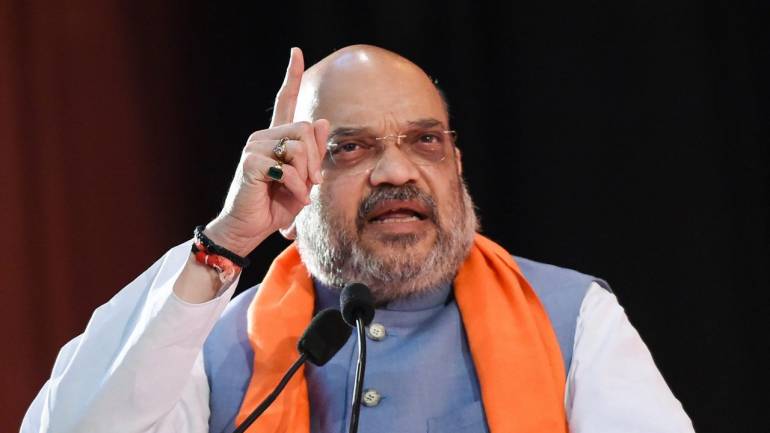In the run-up to the 2019 elections, BJP looks in a formidable position, organizationally. Dissenting coalition partners have been brought on board and as a result, seat sharing formulas have been finalized in Bihar, Maharashtra, Tamil Nadu, and others. Moreover, there is a continuous weakening of the opposition, owing to the defection of key leaders in the last month. Either the key leaders refuse to participate in the Lok Sabha elections, choosing to stay in their state; or, the leaders leave the party altogether. Meanwhile, the plan to form a grand alliance remains mired in squabbling between the Congress and regional parties.
BJP’s impressive organization is primarily at the hands of one person- Amit Shah, the president of BJP. He had created the perfect election-winning machine during the 2014 elections which has only improved in the countdown of 2019.
Realizing this to be the age of alliances, Amit Shah decidedly took it upon himself to ensure smooth coalition formations. In Bihar, BJP decided to ally with the Janata Dal (United) (JDU) and Lok Janshakti Party (LJP). LJP had been BJP’s ally even in the 2014 elections and therefore, seeing as though BJP attained a massive majority in the state, the same model should be repeated. Moreover, allying with JDU is an ingenious move, seeing as the left support will be given to the alliance. Moreover, ever since JDU made its stand on corruption clear by not associating with RJD and called on to Rahul Gandhi and apprised him about the corrupt Lalu Prasad family, their support has been a welcome move. “Seat-sharing was a unanimous decision that was taken keeping in mind the political ground situation in Bihar. All the three parties are hopeful that the NDA will win more seats than it had won in the 2014 general elections,” Amit Shah said at a joint press conference with Kumar and Paswan.
In Maharashtra, BJP firmed up its old alliance with the Shiv Sena. In 2014, after the 25-year-old alliance between the 2 Hindutva parties wore off, BJP had an unprecedented majority in the state, during Lok Sabha as well as the state assembly elections. By this, BJP showed that it was no longer a junior partner in the alliance. Following this realization, Shiva Sena has agreed to ally with BJP and is more than happy in contesting a lesser number of seats than its ally in the state. Amit Shah said that grassroot-level workers of both parties were eager for an alliance and BJP and Sena shared a common ideology based on Hindutva and cultural nationalism. He stated, “This is not just a political alliance, but one based on principles. The two parties have fought for decades on the issues of Ram temple, national security and cultural nationalism and also attained victories. I am sure we will win again”.
In Tamil Nadu, BJP has worked out an arrangement with the All India Anna Dravida Munnetra Kazhagam (AIADMK) and the Pattali Makkal Katchi (PMK). This sends a clear message, that even parties differing with the BJP on various fronts have recognized the commendable work that Prime Minister Modi has done for the nation.
Moreover, West Bengal, which used to be the Achilles heel of BJP, is now seeing unprecedented popularity and support for the party. Amit Shah took it as his personal responsibility to spread BJP’s ideology in the state. However, this was met with fierce resistance by TMC leader Mamata Banerjee. The BJP’s planned ‘Rath Yatra’ in the state was denied permission by the state government. Upholding the ideals of democracy, he called upon Mamata Banerjee’s dictorship rule in the state and stated, “BJP will not stop its fight against the TMC misrule in the state even if the state government uses strong arm tactics. Today the situation is such in the state that people feel Communists’ rule was preferable over TMC’s. The government has murdered democracy in the state.” Reminding the people of the rich Bengal culture, he said, “The BJP shall bring the glory back to Bengal”. Speaking about the citizenship bill, he said, “I want to assure that all the Bengali refugees will be given citizenship under the Citizenship Bill. The TMC government has done nothing for the refugees but we will give them citizenship”. Such mobilization and campaigning has caused Amit Shah to become a very popular leader in West Bengal. The people are tired with Mamata Banerjee’s fierce undemocratic regime and Amit Shah has appeared to be in the form of a new direction towards freedom.
Tamil Nadu and West Bengal have traditionally been the uncharted territories for the BJP. However, Amit Shah has ensured that BJP will be gaining considerable seats from these states. Shah uses every single person in the organisation according to his or her ability. Therefore, it’s not surprising that several people who are never seen around often call the shots on important matters. This goes on to show that BJP has a very strong magnet at the centre. It is a well-organized unit unlike the opposition party’s mahagathbandhan which lacks clarity and coherence.
Moreover, Amit Shah has a major role to play in translating Modi’s personal popularity into a political victory across the country with diverse pain points. It required a multi-pronged, well planned electoral strategy with an implementation roadmap planned to the last detail. Shah performed this role to perfection. Truly the modern-day Chanakya, the country will see many more of his miraculous aspects than just an election machine in the coming months and years.
